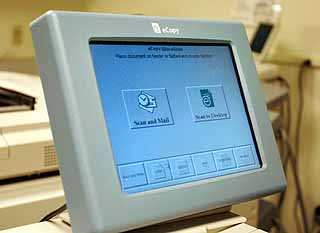
Surveys
DJC.COM
July 28, 2005
Seattle law firms end their paper chase
Foster Pepper & Shefelman

Washburn
|
While waste reduction practices have become commonplace in most industries, a small group of Puget Sound-area organizations have been working for more than a decade to raise the bar — proving that attention to environmental challenges is not only responsible, but can result in cost savings.
One of the largest consumers of paper is the legal industry. In 1994, a group representing many of Seattle's largest law firms, representatives of what was then known as the Business and Industry Recycling Venture and Washington Citizens for Recycling, met to discuss how to implement waste reduction strategies within the legal industry.
Renaming themselves the Law Firm Waste Reduction Roundtable, the group started looking at waste not only in law firms, but also in the courts. They set about developing model materials to help firms audit their waste stream, adopting waste reduction programs, buying materials with recycled content, developing outreach programs with "green teams," moving to electronic court filings and converting documents to digital format, and analyzing cost savings associated with waste reduction.
Within a year, the group had a plan of action and applied for a grant from the Seattle Solid Waste Utility's Less is More program. With the money it developed "The Case for Waste Prevention: A How-to Guidebook by and for Legal Professionals," which was distributed to every law firm in King County. This reference tool has served as the basis for the environmental program developed and maintained at Foster Pepper & Shefelman.

Photo by Sean Harding
Foster Pepper & Shefelman is reducing paperwork with several measures, including this PDF scanner mounted on a copy machine.
|
One law firm's success
Foster Pepper & Shefelman has a green team in place that closely follows waste practices and develops new strategies focusing on waste prevention, recycling and buying recycled materials. It recently won the 2005 BEST (Businesses for an Environmentally Sustainable Tomorrow) Award from Resource Venture, in conjunction with the Greater Seattle Chamber of Commerce, Seattle Solid Waste and Seattle Public Utilities.
Foster Pepper has implemented many programs over the years to reduce consumption and increase recycling, resulting in a 45 percent recycling rate of its trash stream. Technology has been a great aid in this process, as converting text to electronic format has had the single biggest impact on reduced consumption. Tremendous amounts of paper have been saved since the courts converted to electronic filing and used scanners on every copy machine to convert information to PDF format, allowing information to be transferred by e-mail instead of paper.
Converting transcripts for municipal projects and closing books for large real estate transactions to CD format has also had a huge impact on paper consumption.
The firm was at the forefront of establishing extranets for large clients, giving the client complete and around-the-clock access to files and materials in an electronic format. Not only has this saved a huge amount of paper and time, it has allowed attorneys to keep a direct communicative link to their clients.
Some of the firm's more well-established practices include ensuring that all of its business papers are "tree free," with stock made from recycled cotton from cutting room floors. It also has a recycling program for most paper, including glossy magazines, window envelopes, Post-its and NCR paper. The firm's copy paper contains 35 percent post-consumer content, and every computer can print two-sided to the nearest copy machine.
| Cut your waste |
|
Contact Resource Venture at (206) 389-7302 or www.resourceventure.org
|
New employees are introduced to the requirements of Foster Pepper's environmental program as part of their orientation schedule.
If possible, only supplies containing recycled content are used.
Some of the items the firm recycles include:
Even Foster Pepper's law library got into the act when conducting an analysis of its materials to convert to electronic format. The result was more than 6,000 hardbound books needed to be disposed of after conversion. The firm's librarian contacted used booksellers and reached out to the law library community to place the volumes, keeping them out of landfills.
About two-thirds of the books were sold or donated to law libraries all over the United States, including a tribal court and several small county law libraries. The remaining volumes went to a company that uses a sheltered workshop to remove the bindings and recover the recyclable paper.
And, as the firm looks to the necessary destruction of old documents, it is doing so with an eye on recycling. Roughly 4,000 boxes of files are being considered for recycling.
With even a little attention any organization can attain waste reduction goals and be environmentally responsible without negatively impacting its bottom line. Cost savings can be realized and customer service improved by using some simple processes that the advent of electronic communications makes easy.
Tayloe Washburn is chair of Foster Pepper & Shefelman's Executive Committee.
Other Stories:
- Green buildings can spark economic growth
- Whitewater parks move into the mainstream
- Momentum is building to reduce global warming
- Turning waste into environmental, social good
- Let the sunshine in, efficiently
- The hazards of flicking on a light switch
- A road map for Columbia Basin's future
- Canada: A lesson in salmon recovery planning
- Better mapping may change development rules
- What makes a green consumer?
- Farmers, government team up to save fish
- Food industry puts energy efficiency on the menu
- A solution to Hood Canal's lurking pollution?
- Stretching Washington's water supply
- Saving salmon: Now the hard work begins
- Seattle finds gold with sustainable strategies
Copyright ©2009 Seattle Daily Journal and DJC.COM.
Comments? Questions? Contact us.